The Bill of Rights
The Bill of Rights is the First Ten Amendments to the US Constitution. These amendments were passed all at once by the First United States Congress in 1791. These Amendments are a very important part of the Constitution that protect certain rights of American citizens from being violated by the government, rights such as freedom of religion, freedom to bear arms, freedom of the press and the right to trial by jury.
The Bill of Rights played a very important part in the passing of the Constitution in the first place. When the Constitution was first proposed, many individuals and state conventions were concerned that it did not adequately protect the rights of the citizens. Because of this, many people were against the Constitution as it was written. Several state governments decided they would vote to accept the Constitution only if a Bill of Rights was added. A Bill of Rights is a clearly spelled out list of the rights of the people that the government cannot meddle with.
In the end, it was agreed that the Constitution would be accepted as it was written, with the promise that the First Congress would examine the various proposed amendments and would add the best ones to the constitution to cover these concerns. All amendments had to be passed by 3/4 of the states to be added to the Constitution, so this process ensured that the people's concerns about their rights would be addressed.
The states passed ten amendments that became law on December 15, 1791. These Ten Amendments are also known as the Bill of Rights. You can read the Bill of Rights here or find brief overviews of the history, purpose and sections of the Bill of Rights on this page, with links to more in depth information.
Purpose of the Bill of Rights
The American Bill of Rights was introduced because of arguments that arose against the newly proposed US Constitution when it was first introduced. The Bill of Rights served two primary purposes, to define a list of specific individual rights that the government could not encroach upon and to alleviate the fears of the Constitution's detractors so they would support it.
After the Constitutional Convention produced the Constitution, it was sent to the states for their review. Each state formed its own Constitutional Convention to accept or reject the Constitution. They were known as "ratification" conventions, because to "ratify" means to accept.
A lengthy debate began in each colony about the merits of the Constitution. The Constitution's supporters were known as Federalists, because they supported a strong central government. The Federalists were led by such men as James Madison, Alexander Hamilton and John Jay. The Constitution's detractors were known as anti-Federalists. They believed the Constitution gave too much power to the central government at the expense of the states and individuals and were led by such men as Patrick Henry, George Mason and Elbridge Gerry.
Most people agreed that a stronger government was needed. Since the end of the Revolutionary War, the country had been governed by the Articles of Confederation, which created a very weak central government that turned out to be so weak that it couldn't raise revenue, support troops, enforce laws or even require its legislators to meet.
The colonists had purposely created a weak central government because of their fear that the government could grow too powerful - the very reason for the Revolutionary War in the first place. After a while though, they realized the government they had created could barely function and as such, would not be able to protect them from foreign enemies or do anything else that a governments ought to do.
This was the reason for the creation of the Constitution, to create a new, stronger government to replace the weak one under the Articles of Confederation. Once it was decided to make a stronger government, however, the citizens still had to decide how strong they wanted this government to be.
Once the ratification debates began, it soon became apparent that the Constitution would not be accepted in several of the states because of this very concern - that the central government would be too powerful. Anti-federalists condemned the fact that the Constitution did not have a Bill of Rights, which is a list of specific rights of the people that are not to be violated by the government.
To alleviate the fears of the anti-Federalists, the pro-Constitution forces promised that the First Congress would add a Bill of Rights to the Constitution if they would go ahead and accept it. This promise persuaded enough anti-Federalists to support the Constitution that it finally passed.
You can learn more about the purpose of this important document at our Purpose of the Bill of Rights page.
Passage of the Bill of Rights
The First Congress began its session in March of 1789. On June 8, James Madison, the chief author of the Constitution, gave a speech to Congress in which he submitted 20 of the most requested amendments for consideration. You can read James Madison's June 8, 1789 speech here.
Congress debated these and eventually chose twelve amendments to send to the states for ratification. Each state then considered each of the amendments. 3/4 of the states had to pass each amendment in order for it to become part of the Constitution. Eventually, ten of them were accepted by the states and these have become known as the Bill of Rights. They became law with Virginia's ratification on December 15, 1791.
You can learn much more about the creation of the Bill of Rights at our history of the Bill of Rights page here.
Picture of the Bill of Rights
View a history of the Bill of Rights in pictures at our Bill of Rights Pictures page. You will see the original Bill of Rights that is now housed at the National Archives.
We also have pictures of letters from George Washington and James Madison revealing their opinions about the Bill of Rights.
You can see Madison's handwritten notes he used to give his June 8, 1791 speech in which he introduced 20 amendments to be considered by Congress, as well as his original copy of the Bill of Rights.
After the Bill of Rights was passed, President George Washington had thirteen handwritten copies made for each of the thirteen states. Several of these copies are still in existence today and can be seen here.
Take a look at all of these fascinating images at our Bill of Rights Pictures page here.
The First Amendment
The First Amendment is one of the most well known parts of the US Constitution. It forbids the Congress from making any...
law respecting an establishment of religion, or prohibiting the free exercise thereof; or abridging the freedom of speech, or of the press; or the right of the people peaceably to assemble, and to petition the Government for a redress of grievances.
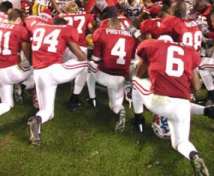
If it weren't for the First Amendment, politicians could dictate to you how you could or could not express faith in God, what you could say or could not say in public and who you could or could not gather together with. It is a bedrock of the freedoms enjoyed in this country.
The Bill of Rights was added to the Constitution by the First Congress to ensure that the government would never encroach upon the listed rights of the people. The general attitude of the Founding Fathers was that human rights were not granted by the government, but protected by the government. The rights themselves came from God as a gift to humans by virtue of their being human.
Many of these key rights are protected from infringement by the First Amendment.
- The Establishment Clause says "Congress shall make no law respecting an establishment of religion. This means Congress cannot force Americans to be part of any state religion or believe in any particular creed. Without this provision, Congress could establish a state religion and force everyone to participate. It could also punish those who refused to be a part of it. Learn more about the Establishment Clause.
- The Free Exercise Clause forbids Congress from interfering in the "free exercise"
of religion. In other words, Congress is not to make laws regarding how
Americans may or may not express their religious beliefs. They cannot
regulate how, when, or to whom Americans must pray, or whether they
should even pray at all. They cannot tell people how to worship, when or
where to attend church or what beliefs they must hold. You can learn
more about the Free Exercise Clause here.
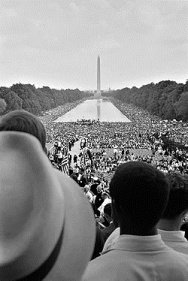
- The Freedom of Speech Clause forbids Congress from making any laws "...abridging the freedom of speech." British history included a long train of people being punished and even executed when their speech didn't agree with the authorities. The Americans wanted to ensure that they could always express their opinions without the fear of punishment by officials who disagreed. You can learn more about the Freedom of Speech Clause.
- The Freedom of the Press Clause guarantees Congress will not make no law abridging the freedom of the press. British history contained no freedom of the press. Every publication was subject to government review. Freedom of the press was extremely important to the Founding Fathers because the press was a key source of spreading information during the Revolutionary War. Learn more about the Freedom of the Press Clause here.
- The Freedom of Assembly Clause guarantees Americans the right to assemble with anyone they want. It was an important right to the Founding Fathers because without this right, the government could tell people when and with whom they could meet and thereby restrict their ability to communicate and organize opposition to the government. Many groups such as civil rights groups, women's suffrage groups and labor unions have taken advantage of this right over the years. You can learn more about the importance and history of the Freedom of Assembly Clause here.
- The Freedom of Petition Clause says Congress shall make no law abridging the freedom of the people "to petition the Government for a redress of grievances." This was very important to the Founding Fathers who tried over and over again to get the British Parliament and King George III to address their grievances with no success. It gives Americans the ability to address the government about their concerns and ensure that their voices are heard. Learn more about the Freedom of Petition Clause here.
Learn more about the First Amendment and the different rights it protects here.
First Ten Amendments
The First Ten Amendments are collectively known as the Bill of Rights. Each amendment covers various rights that are guaranteed to American citizens, including freedom of religion, freedom to assemble, freedom from cruel and unusual punishment and freedom not to incriminate oneself at trial. You can read more about each of these First Ten Amendments and the rights they protect here.
1st Amendment

The 1st Amendment protects the rights of freedom of religion, freedom of speech, freedom of the press, freedom of assembly and freedom to petition the government. Without this right, the government could tell people how and when to pray, what religion they must follow, what they can or cannot say, who they can gather together with, what they can publish or broadcast and could refuse to listen to their grievances.
The First Amendment is considered to be one of the bedrocks of American civilization and is highly valued by all American citizens. The rights it guarantees are longed for by people around the world who live under governments that violate these rights everyday. The First Amendment is one of the reasons why people from every country seek to come to the United States. They want to enjoy the same rights that American citizens enjoy as a result of the First Amendment.
2nd Amendment
The 2nd Amendment guarantees the "right of the people to keep and bear arms."
The 2nd Amendment is highly valued by Americans who want to hunt or protect themselves in case of danger. The right to bear arms was very important to the Founding Fathers because they did not want the government to overpower the citizens if the government should become corrupt. If citizens were not allowed to own their own guns, they could easily be controlled and enslaved by the government.

In recent years, the meaning of the 2nd Amendment has been debated vehemently. Some people believe the Amendment was only meant to allow the states to form their own militias for purposes of defense and that it has nothing to do with individuals owning guns for other purposes.
Others believe the 2nd Amendment grants all citizens the right to have guns under any circumstances. Some recent court decisions have created limitations on the ability to own guns, such as those that create zones where guns may not be carried or require licensing, classes or background checks to own a gun.
You can learn more about the history and meaning of the 2nd Amendment here.
3rd Amendment
The 3rd Amendment forbids the government from quartering troops on the private property of individuals. Prior to the Revolutionary War, the British government had passed the Quartering Act of 1765 and the Quartering Act of 1774, which required private citizens to house soldiers on their property if there were no public accommodations available.
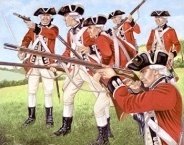
This was one of the grievances listed by Thomas Jefferson in the Declaration of Independence. In addition, the Quartering Acts required private citizens to provide food for any soldiers staying on their property.
The 3rd Amendment guarantees the government will not house troops on private property during peacetime and only as prescribed by law during times of war.
The 3rd Amendment is one of the least familiar to Americans today because so few wars have been fought on American territory and because the American army is housed on large military bases.
You can learn more about the history and meaning of the 3rd Amendment here.
4th Amendment
The 4th Amendment protects American citizens from illegal searches and seizures of their private property and requires that a warrant be issued in order for a government official to search or seize private property.

The 4th Amendment had its origins in the British "writs of assistance" that were used by colonial officials to search for smuggled contraband. The colonists had a habit of trying to evade customs taxes on imported goods because the taxes were so high. In response, the customs officials would get a "writ of assistance," which gave them authority to search any private property, any time they wanted.
This greatly angered the colonists and was one of their chief grievances against the Crown. When the Bill of Rights was added to the Constitution, the citizens wanted their rights spelled out very clearly when it came to searches, seizures of private property and warrants.
The 4th Amendment generally requires that in order for a search to be conducted of private property, a warrant must be issued by a judge and only when there has been probable cause demonstrated that a crime has been committed. There are some exceptions, but generally speaking, if evidence of a crime is obtained outside of this process, the search and seizure is illegal and the evidence is not admissible in court.
Learn more about the history and protections of the 4th Amendment here. Read about some of the most significant 4th Amendment Court Cases here.
5th Amendment
The 5th Amendment is one of the most important of the amendments listed in the Bill of Rights and is also one of the most familiar to Americans due to the phrase "I plead the Fifth," which is a defense often used in criminal trials.

The 5th Amendment protects several different rights, including:
- The Right to be indicted by a Grand Jury for serious federal crimes.
This protection uses a group of average citizens to review the evidence
first to declare whether or not a potential case should go to trial.
This is a protection against corrupt government officials who might
attempt to try someone unfairly. You can read more about the Grand Jury Clause here. Learn about the most important Grand Jury Clause Cases here.
The Grand Jury Exception Clause makes an exception to the right to have evidence examined by a grand jury for military personnel. The Founders did this because of the unique situations that occur for military personnel on the battlefield. Regular citizens and judges wouldn't be able to relate to the situations faced by soldiers so separate military courts were set up for them. You can learn more about the Grand Jury Exception Clause here. You can also learn about the most important Grand Jury Exception Clause Cases here. - The right to not be tried or punished twice for the same crime. Modern courts apply this to all cases unless the first trial was found to be somehow fraudulent. To be tried or convicted for the same crime twice is known as Double Jeopardy. You can learn more about the Double Jeopardy Clause here. Learn about several of the most important Double Jeopardy Cases here.
- The right to not testify against oneself in criminal proceedings. At one time, English citizens could be tortured for not confessing to crimes of which they were accused. This led to many faulty confessions and convictions because people would confess to the crime, even if they didn't do it, to avoid being tortured. This practice was finally challenged and the right to not testify against oneself became standard practice in English law. The right was also highly valued by the Founding Fathers and was included in the Bill of Rights. You can read more about the Self-Incrimination Clause here. Read about the most important Self-Incrimination Cases here.
- The right to be deprived of life, liberty or property only by due process of law. This right means that the government must follow written law and procedures when dealing with criminal or administrative matters. In other words, government officials cannot make up rules on a whim in dealing with people. The Due Process Clauses of the 5th and 14th Amendments have been the subject of much controversy due to many rulings by the Supreme Court. Many believe the Court has used Due Process to wrest power away from state legislatures and Congress due to using very broad definitions of "life, liberty and property," that have created many "rights" not listed in the Constitution. Learn more about the Due Process Clause here. Learn about several of the most important Due Process Clauses Cases here.
- The right to be paid a reasonable amount of money if the government needs your property for public use. If the government needs your property to build a highway or a school, it must pay you a reasonable amount of money for the transaction. The private citizen has no right to say "No, I don't want to sell it," in this case, but he must be fairly compensated. In recent years, some jurisdictions have attempted to use this procedure, known as Eminent Domain, to take private property from one party and sell it to another, if the new use of the property would somehow benefit the public. The constitutionality of this procedure has been the subject of much debate in recent years. Learn more about the history and purpose of the Eminent Domain Clause here. You can also learn about many of the most important Eminent Domain Cases here.
You can read more about the history, meaning and purpose of the 5th Amendment here.
6th Amendment

Of the 26 rights guaranteed in the first 8 amendments of the Bill of Rights, 15 of them have to do with the rights of those accused of a committing a crime. British history included a long history of false accusations for political and religious differences. People were often charged and punished unfairly for things they didn't do if they were in disagreement with the authorities. People had been imprisoned, tortured and even killed for things as simple as choosing a different religion than the king or speaking out against a government official.
The 6th Amendment guarantees the accused of 7 specific rights:
- The right to a speedy trial
- The right to a public trial
- The right to be judged by an impartial jury
- The right to be notified of the nature and circumstances of the alleged crime
- The right to confront witnesses who will testify against the accused
- The right to find witnesses who will speak in favor of the accused
- The right to have a lawyer
- The Speedy Trial Clause guarantees that you must be tried quickly and not left to sit in jail for a long period of time before trial. You can find a summary of some of the most important Speedy Trial Cases here.
- The Public Trial Clause guarantees that trials must be conducted in public in order to prevent false charges or other underhandedness by court officials. Some of the most important Public Trial Cases are summarized here.
- The Right to Trial by Jury Clause guarantees the accused that a jury of his peers will decide his fate, rather than court officials who might be corrupt. You can find a summary of the most important Right to Trial by Jury Cases here.
- The Arraignment Clause guarantees that you must be informed of the charges against you. A summary of the most important Arraignment Clause Cases can be found here.
- The Confrontation Clause guarantees you the right to confront and challenge any witnesses testifying against you. You can also learn about some of the most important Confrontation Clause Cases here.
- The Compulsory Process Clause guarantees the right to call witnesses to testify on your behalf and have the government force them to testify even if they don't want to. Read about some of the most significant Compulsory Process Clause Cases here.
- The Right to Counsel Clause guarantees you the right to have an attorney assist you if you are charged with a crime. You can also see a summary of the most important Right to Counsel Cases here.
Learn more about the history, purpose and meaning of the 6th Amendment here.
7th Amendment
The 7th Amendment guarantees the right to trial by jury in civil cases, while the 6th Amendment guarantees the same right in criminal cases. The same right is guaranteed in the case of an infamous crime, or felony, in the 5th Amendment. The right to trial by jury was clearly important to the Founding Fathers, or they would not have mentioned it so many times in the Bill of Rights.

The colonists had gone through a period of being denied the right to trial by jury under the British Crown. Due to high taxation and trade laws, colonists were heavily engaged in smuggling. Officials began to try and convict more and more colonists for their smuggling operations, but colonial juries frequently acquitted the accused smugglers, even if they blatantly violated the law. This caused the King to set up new courts without juries, so they could not undermine the convictions. This gave an enormous amount of power to judges who often had personal motives to convict the accused, such as earning a percentage of the judgement against them, or to earn favor and promotion in the eyes of the crown.
The Founding Fathers saw trial by jury as a defense against just such corrupt government officials. In a trial by jury, a group of the accused's own peers would make the determination of guilt or innocence, rather than one individual in the employment of the government. The accused's neighbors and peers are likely to have similar interests and beliefs as the accused person. The possibility for corruption is much less likely with a jury trial than if the decision lies in the hands of a single judge, who may have personal motives against the accused or an agenda he wishes to promote.
Learn more about the history, meaning and purpose of the 7th Amendment here.
8th Amendment
The 8th Amendment to the Constitution protects three rights for all Americans. It requires that:
- Excessive bail shall not be required
- Excessive fines shall not be imposed
- Cruel and unusual punishments shall not be inflicted
The Excessive Bail Clause
Bail is paid by an accused defendant in order to get out of jail before the date of his trial. If the defendant shows up for his trial, the bail money is returned to him, but if he fails to show up for his trial, he forfeits the money.
Bail must be set sufficiently high that the accused person has an incentive to show up for trial so he does not lose his money, but it cannot be set so high that it is an unreasonable amount.
This was important to the Founding Fathers due to instances in British history when judges required such high bail that there was no way accused people could pay it. Judges often did this to punish people with different political beliefs than their own.
The Excessive Fines Clause
The Courts will not allow fines that are grossly disproportional to the seriousness of the offense. Even so, higher courts rarely overturn the decision of a lower court where fines are concerned. This is one of the least used provisions of the Bill of Rights. In fact, the Supreme Court never overturned a case for violating the Excessive Fines Clause until 1998.
The Cruel and Unusual Punishments Clause
Great Britain had a long and terrible history of cruel and unusual punishments inflicted on convicted criminals, things such as burning at the stake, chopping off body parts, crucifixion, castration, breaking on the wheel and so on. America's Founding Fathers wanted to make sure no such punishments were inflicted in the United States.
In general, a punishment is considered to be cruel and unusual if the majority of the public would deem it to be so, but if the majority of the public approves of a certain type of punishment, it is usually allowed. The Supreme Court has stated, based on this clause, that punishments must be in proportionality to the crime committed.
Over time, the Court's definition of "cruel and unusual" has changed. For example, the death penalty was allowed in all of the original 13 states for crimes other than murder, but today, it is not allowed for crimes other than murder or treason. It is also not allowed if the guilty was younger than the age of 18 or mentally incompetent at the time of the crime.
Death by lethal injection, hanging, the firing squad and by the electric chair are still allowed today.
You can learn more about the history and meaning of the 8th Amendment here. You can also read about some of the most influential and important 8th Amendment Court Cases here.
9th Amendment
The 9th Amendment is one of the least referred to amendments in the Bill of Rights. It is also probably one of the most important and controversial. The 9th Amendment says, "The enumeration in the Constitution, of certain rights, shall not be construed to deny or disparage others retained by the people."
In plain language, it means that although the Constitution lists certain rights of the people that may not be violated by the government, there are also other rights of the people that are not listed, that the government may not violate either.
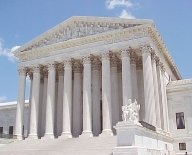
The Founding Fathers believed that man inherently has natural rights by virtue of his being human and that the government should not violate those rights. They also thought it was impossible for them to list all such rights. Instead, they addressed some of the most important in the Constitution, but left the States to determine the rest, as is spelled out in the 10th Amendment.
The problem is that the modern Supreme Court has taken it upon itself to determine what those extra, unlisted rights are and the States and the people have not challenged the Court in this endeavor.
Today, a small handful of unelected judges often throws out the laws passed by the people through their legislatures in the name of "protecting civil rights." In reality, the Courts often violate the will of the people by throwing out their laws and forcing their own will upon the people. This is a source of much contention in modern political debate.
You can learn more about the history, meaning and purpose of the 9th Amendment here.
10th Amendment
The 10th Amendment reserves any rights not granted to the Federal Government in the Constitution to the states. The Founding Fathers were extremely concerned that the government not be too powerful. After all, they had just fought a war to get rid of a tyrannical government.
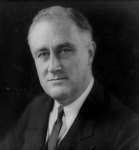
D. Roosevelt
They created a government which listed the specific responsibilities of each branch of government. The Bill of Rights was added to further specify the rights the government could not encroach upon. The Founders wanted local governments to make most decisions in their lives because local governments would be easier for the people to control. Consequently, the 10th Amendment says that any powers not specifically given to the federal government were reserved to the states.
In recent years, through a set of gradual changes, this right of the states has been largely abandoned. The Courts and Congress have taken the initiative to legislate in many areas that were once reserved to the states. This all began around the time of President Franklin Delano Roosevelt and the New Deal programs, which created many federal jobs to help people get through the Great Depression. The New Deal jobs programs caused many people to look to the government to play a larger role in their lives than it had before. Since then, that role has grown larger and larger.
You can learn more about the history and purpose of the 10th Amendment here.
Read the Bill of Rights
It is important for Americans to understand their rights that are protected by the Constitution. If you do not know what rights you have that are not to be violated by the government, you could easily have these rights taken away by slick tongued politicians. A good place to start is by actually reading the Bill of Rights and understanding the protections it provides. You can read the Bill of Rights here. It will only take you a few minutes. It's not very long!
Amendments:
Preamble to the Bill of Rights
Learn about the 1st Amendment here.
Learn about the 2nd Amendment here.
Learn about the 3rd Amendment here.
Learn about the 4th Amendment here.
Learn about the 5th Amendment here.
Learn about the 6th Amendment here.
Learn about the 7th Amendment here.
Learn about the 8th Amendment here.
Learn about the 9th Amendment here.
Learn about the 10th Amendment here.
Learn more about the Bill of Rights with the following articles:
- For a brief synopsis of the First Ten Amendments.
- Learn about the Purpose of the Bill of Rights here.
- Read about the History of the Bill of Rights here.
- Look at the Bill of Rights in Pictures here.
Last updated 8/10/12
Revolutionary War and Beyond Home
Like This Page?
© 2008 - 2022 Revolutionary-War-and-Beyond.com Dan & Jax Bubis

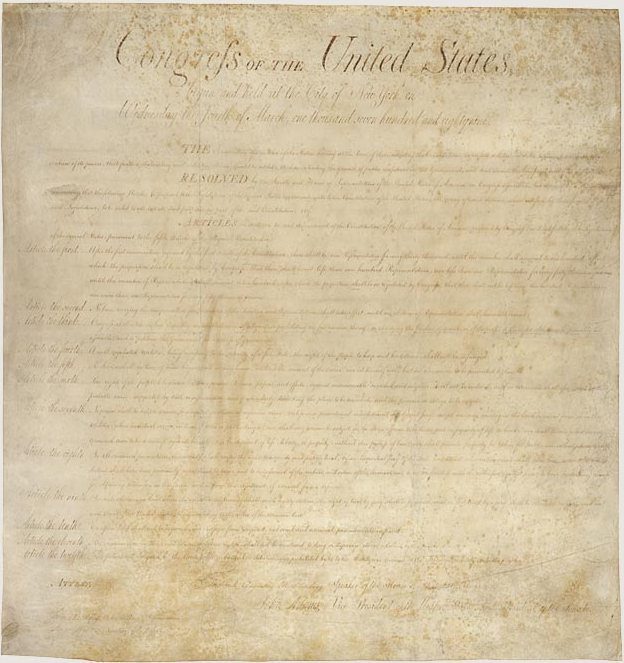
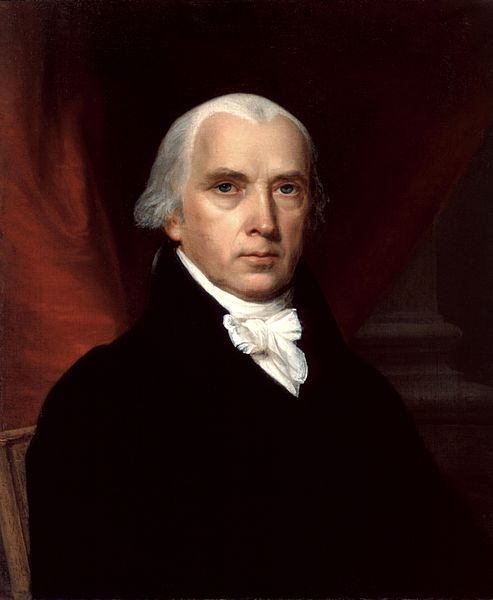
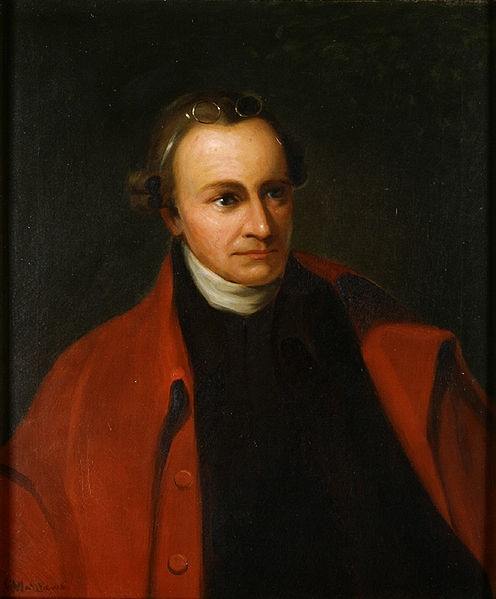

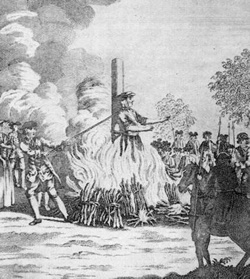









Facebook Comments